If you’ve ever been camping, you’re probably familiar with tents, whether a $20 A-shaped wonder or a more expensive unit that takes only 30 seconds to set-up. You might have even gotten off the bush floor and into a camper trailer, with their inbuilt comforts, storage space and cooking facilities. So in the debate over which is better, tents or camper trailers, the winner is obvious, right? Surely no tent can match a camper trailer.
But if you look deeper, you’ll see there’s a little more to it. Let’s take a look at the pros and cons of each style of camping.
TENTS
Hands down, on the question of price alone, tents win every time, even factoring in any additional bedding and portable cooking facilities.

What’s more, you probably won’t need a 4WD, so it’s likely to be cheaper to travel with a tent instead of a camper trailer. The maintenance on a tent is much less onerous, too.
As mentioned, there are plenty of tents, such as the 30-second Oz Tent and Black Wolf Turbo range, that take almost no time to set-up. Camping in that tight spot beside that perfect river is bound to be easier in a tent than a camper trailer, too.
Now, travelling with a tent may still mean you’ll need a garden-variety trailer to haul all the gear (depending on how you pack). And that’s where a rig such as the Pod comes in. Completely enclosed and virtually bulletproof, it’ll haul your tent and much more wherever you want to go. What’s more, you could use it for weekend tip runs, so it’s more than just a unit for camping holidays.
The biggest drawback of a conventional tent? The time it takes to set-up camp and pack everything away. Also, it’s highly unlikely any tent will be as organised as even a basic camper trailer. And on the question of thermal efficiency – warmth in the cold, shade in the sun – a tent could never really compete with a decent camper trailer.
CAMPER TRAILERS
A comfortable innerspring mattress, a fully-equipped kitchen, storage space for tools and food, not to mention a 12V setup for camp lighting and charging various portable devices… there’s a lot to be said for a good camper trailer.
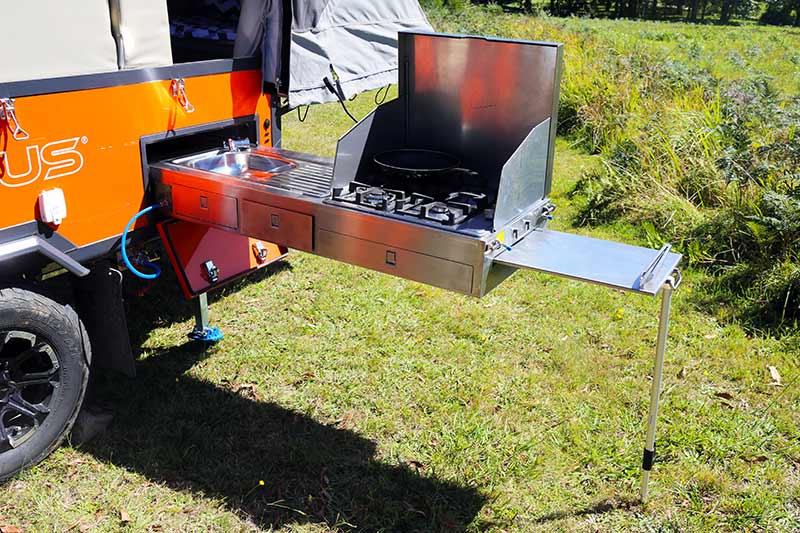
Every tent and camper is different, of course, but it’s likely that a camper will offer more shade and it will certainly have thicker canvas and therefore better protection from the elements. A hard-floor camper will get you and the kids off the ground, where it’s less rocky and much warmer at night.
Naturally, a camper trailer needs a tow vehicle and no matter what that vehicle is, the added weight will increase your fuel usage and wear and tear on the engine – increased service intervals are a given.
As for storage… well, you’d better have that one sorted out as, unlike with a tent, you can’t stack a camper trailer neatly in the garage. Your insurance company would like to know where the camper is being stored. Speaking of insurance, that’s another expense, as is registration.
WRAP-UP
Nothing in life is cut-and-dry, not even camping. As beneficial as a good camper trailer can be, they do have drawbacks that are easily solved by choosing a tent instead. And vice versa.
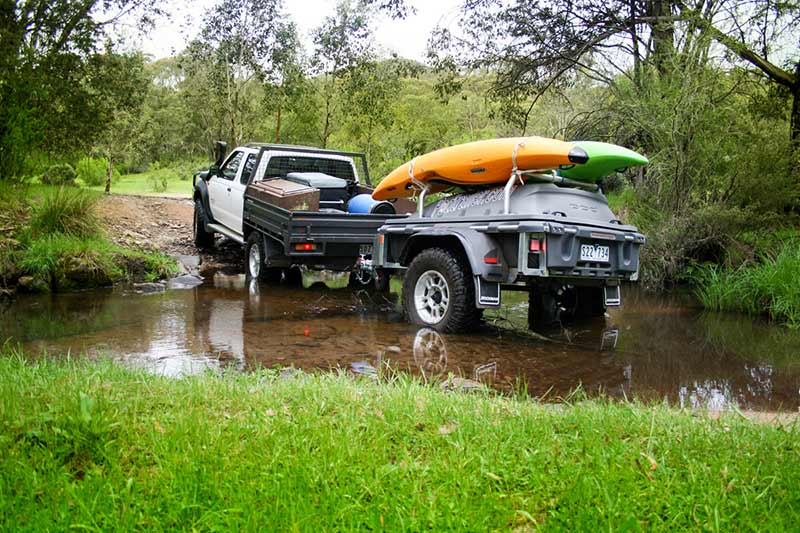
In the case of tents, a unit such as the Pod trailer by Stockman solves many of these drawbacks, increasing campsite storage and organisation, and because it’s light – only 200kg – it’s highly unlikely you’ll need to upgrade your tow vehicle and the weight shouldn’t increase fuel consumption too much.


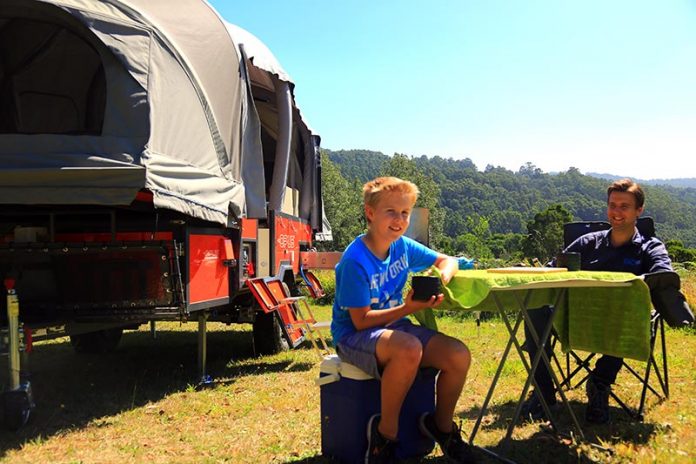

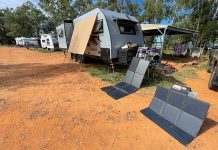
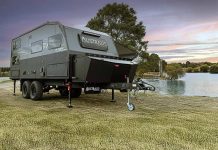

Had tents, camper trailer, windup pop out caravan and full blown caravan and now a shack. Best of all from my opinion wind up pop out. As you get older mover through the next phases
Interesting list of pros and cons! We’ve owned the same camper trailer for 20-odd years – cost over the long-term means it may end up cheaper than a tent. You’ll also need storage space for the trailer you use for all your tent stuff too. All our camping stuff is already in the camper trailer, so packing up to head off is a cinch, and that means far less packing up time. We’ve towed our camper with standard and AWD vehicles, but never a 4WD – if you’re going way off the beaten track with your tent, you’ll need a 4WD for that too 😀 I’m not trying to convince anyone either way – depending on where we’re going, who we’re with and the facilities available, there are definitely times when we would choose the tent option too! Thanks for the chance to comment!!
Good article but I didn’t understand the comment: ‘What’s more, you probably won’t need a 4WD, so it’s likely to be cheaper to travel with a tent instead of a camper trailer’.
A four wheel drive is not necessary for towing a camper but it is necessary if you intend to camp in your tent on Fraser Island.
Even if you have a trailer of any sort, a reasonable tent is a great thing to travel with. It can be set up in areas that are not accessible with the van or camper. If at one place for a while it is a good place to store gear in.
In my opinion, if you need a trailer to carry your tent and all your gear, then why not have a campertrailer. We have gone from tent to soft floor and now wind up pull out trailer. Too much setup time with the first two options as we mostly only do weekends, but all have their purpose.
We live in a wet climate, so indoor storage is a must! Many of our friends who have camper trailer (tent trailer as we call them) get moldy sitting in the driveway…the only way to avoid this is to store them in your garage (preferably heated), and set up in your garage is even better! We hope to transition to a trailer (camper) some day, but tents for now.